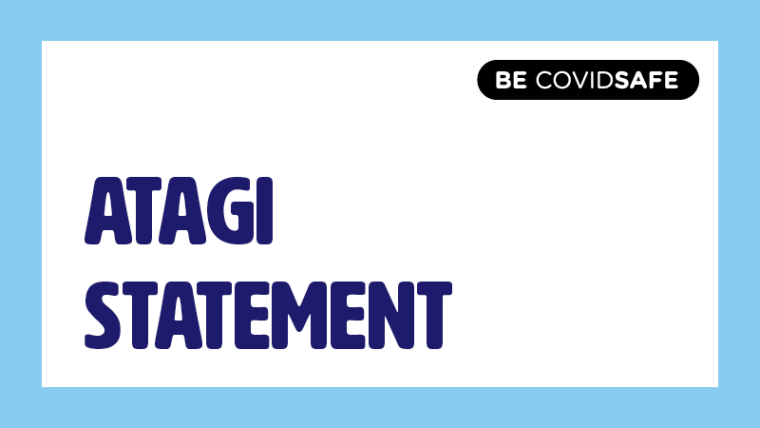
Summary
ATAGI has updated its recommendations for a winter dose of COVID-19 vaccine to help reduce severe disease from the emerging surge of Omicron BA.4 and BA.5 subvariant infections, and to reduce the burden on Australian hospitals and the healthcare system in coming months.
The updated recommendations are:
- Adults aged 50 to 64 years are now recommended to receive a winter booster dose of a COVID-19 vaccine.
- Adults aged 30 to 49 years can receive a winter booster dose of a COVID-19 vaccine, however the benefit for people in this age group is less certain.
- The interval recommended between a recent SARS-CoV-2 infection or the first booster dose and a winter booster dose is now 3 months.
ATAGI emphasises that people previously eligible for a winter booster dose remain at higher risk of severe disease and death from COVID-19 and should receive a winter booster dose as soon as possible. They include:
- all adults aged 65 years or older
- residents of aged care or disability care facilities
- Aboriginal and Torres Strait Islander people aged 50 years or older
- people who are severely immunocompromised (this will be their fifth dose)
- people aged 16 years or older with a medical condition that increases the risk of severe COVID-19 illness
- people aged 16 years or older with disability, significant or complex health needs, or multiple comorbidities which increase the risk of a poor outcome.
ATAGI emphasises that individuals who have previously been infected with SARS-CoV-2, irrespective of which variant it may have been, should continue to receive recommended vaccine doses, after an interval of 3 months, as prior infection alone will not provide sufficient protection against severe disease.
Rationale
The number of people ill from respiratory virus infections, including from COVID-19, has increased over the past few months, placing an increased strain on the Australian healthcare system, particularly hospitals. A surge in cases of COVID-19 from the SARS-CoV-2 Omicron BA.4 and BA.5 subvariants is a contributing factor and is expected to worsen in the coming months. Increasing the uptake of winter booster doses of COVID-19 vaccine in populations most at risk during this time is anticipated to play a limited, but important role in reducing the risk from COVID-19 to individuals and pressure on the healthcare system.
ATAGI notes with concern that coverage with first booster and winter booster doses of COVID-19 vaccine at this time are suboptimal , 70.6% and 59.5% of the respective eligible populations who have completed prior doses.1 ATAGI emphasises the importance of vaccination in preventing severe disease and death during this time, particularly in older adults and people aged 16 years and older with a medical condition or disability.
Protection against Omicron BA.4 and BA.5
The Omicron BA.4 and BA.5 subvariants can partly escape the immune response generated by both prior vaccination and infection. 2,3 A first booster dose of COVID-19 vaccine has been shown to increase the immune response to these new subvariants, but wanes over several weeks. 2 A winter dose (the second booster dose) is anticipated to boost this immune response.
Reducing the interval between a first booster dose and a winter dose from 4 months to 3 months will also help provide earlier protection as infection rates rise. ATAGI re-emphasises that those individuals who have previously been infected with SARS-CoV-2, irrespective of which variant it may have been, should complete their vaccination course. Vaccination in addition to infection, as compared with prior infection alone, offers the best available protection against reinfection.
Based on first principles and currently available evidence, reaching a higher level of coverage of the COVID-19 winter booster dose in older adults, including those aged 50 to 64 years, is likely to reduce the number of COVID-19 related hospitalisations over the coming months. However, the impact of this expanded vaccine booster recommendation alone is expected to be limited. ATAGI advises that other public health and social measures, in addition to vaccination, will have the greatest impact against the Omicron BA.4 and BA.5 surge in infections. This includes increased use of masks and increasing the use of antiviral treatment in people diagnosed with COVID-19, including in people aged 50 years and above.
Rates of hospitalisation, severe disease, and death from COVID-19 are lower in adults aged 50-64 years when compared with older adults, especially in people that have received a first booster dose.
ATAGI recognises that some people aged 30 to 49 years would also like to reduce their risk of infection from COVID-19 and therefore may consider a winter booster dose. While rates of hospitalisation, severe disease, and death from COVID-19 are low in this age group, other factors such as time off work and the risk of long COVID may influence an individual’s personal decision to have a winter booster dose. The impact of vaccination on transmission and maintenance of healthcare capacity in this age group is uncertain but likely to be limited.
At this moment, ATAGI does not support making the winter booster dose available to healthy adults aged less than 30 years as it is unclear whether the benefits outweigh the risks in this population. However, a winter booster dose







